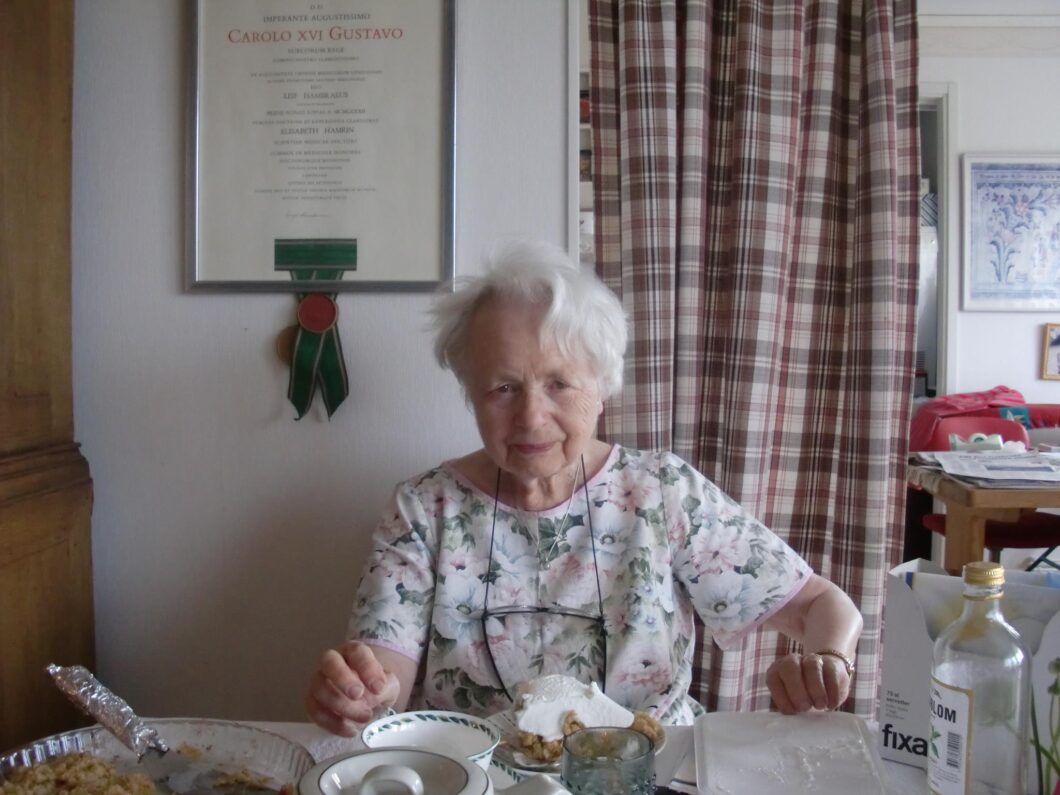A few days ago, this image popped up on my fb feed as a memory. I’m not a fan of social media, but I do enjoy this particular feature that manages to throw one back to old memories and conversations with friends and family. This is my friend Elisabeth Hamrin, at one of our regular dinner meetups in her home at Ådalagatan, in Linköping. We are having homemade apple pie with ice-cream. A few weeks ago, I got the news that Elisabeth, at the age of 92, had passed away. Since then, a flood of memories have washed over me. Her friendship and unwavering support meant a lot to me during my phd student years at Linköping University but more than that, it is her legacy and work that I want to preserve and share.
Elisabeth Hamrin was a Professor of Nursing Science at Linköping University. When I met her, I had just finished my studies in Sociology and was figuring out what I wanted to do next. I had joined a program called The Peace Agents, a project created and run by the Christian Study Association Sensus together with then newly formed Muslim Study Association Ibn Rushd. The project aimed to counter Islamophobia in Sweden through promoting dialogue and understanding between Muslims and the larger society. Elisabeth was a strong supporter of this project, a support that came from her own work and background in Iofc (Initiatives of Change) where she for decades had worked on issues of promoting peace and understanding between groups. She truly believed in the need for people to work together, across religious and ethnic boundaries for the betterment of society. I met Elisabeth through the Peace Agents project in 2009. Elisabeth was in her 70s but her positive energy, openness, and enthusiasm was striking. She was still actively engaged in Iofc, travelling countries, and doing research. She was curious about us young Muslims who were participating in the project. Now, when I think about it, times were different back then. This was before the rise of the racist party Sweden Democrats and the official discourse on immigration and integration was still about promoting openness and believing in coexistence across differences. There was no question of whether Islam and Muslims were a natural part of the Swedish society. Everyone engaged in the project believed it, and so did Elisabeth.
Elisabeth would often talk about her choice of becoming a nurse. The fact that she first entered the world of medicine as a medical student but soon discovered that something didn’t feel right. After taking a break from her studies, Elisabeth went abroad for a couple of years where she discovered IofC (back then known as Moral Re-Armament). She became increasingly involved in their work in Switzerland and the US where she toured with a theatre group. When she came back to Sweden she decided to become a nurse. Elisabeths reasoning was that she would be able to help more people through the nursing profession and so, to her father’s dismay, she quit medicine. Elisabeth would often share this story with her friends, and it was obvious that the fact that her father didn’t speak to her for years, had been painful for her. But what had been a difficult decision, led Elisabeth on the path of a remarkable life journey, showing that sometimes the difficult decisions to leave things that no longer work, may open doors towards something bigger and better. Elisabeth went on to become one of the first women to earn a doctoral degree in the field of Nursing Science, in 1981. She was a pioneer in establishing Nursing Science as a research area in Sweden, and became the first Professor within this subject at Linköping University. Her main research expertise was on experiences of stroke patients, their care, and rehabilitation. She worked on these issues in countries like Poland and India. For many years, she was also actively engaged in the Stroke Society, an organisation providing information and support to stroke patients and their families.
Through the years, me and Elisabeth would regularly meet up for dinners. There were also birthdays, Iftars, Eid and Christmas gatherings. Once I moved to Stockholm, our correspondence became less frequent. My new life in Stockholm took over, and her deteriorating health with beginning stages of dementia made it increasingly difficult to stay in touch. I still wish I had kept in touch during her last years. Today, on the 11th of June, Elisabeth would have turned 93. She would always have an open house party on her birthday, where people across generations and from all walks of her life would come by to celebrate her. She lived a long and rich life, endlessly working for the betterment of humanity. Her legacy within Nursing Science will always remain but through all the seriousness and hard work, she was also a kind and caring friend, with an enormous curiosity and enthusiasm for life and the world around her.
Thank you, Elisabeth, for everything.

